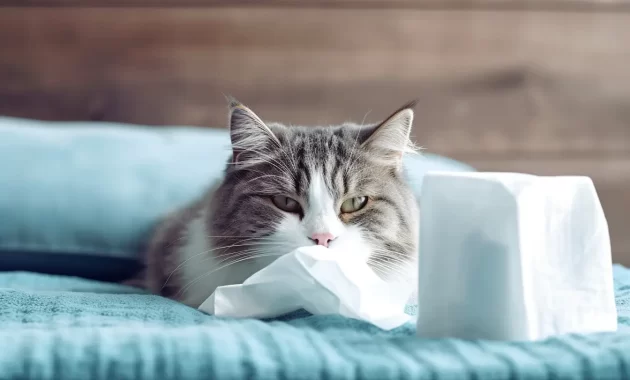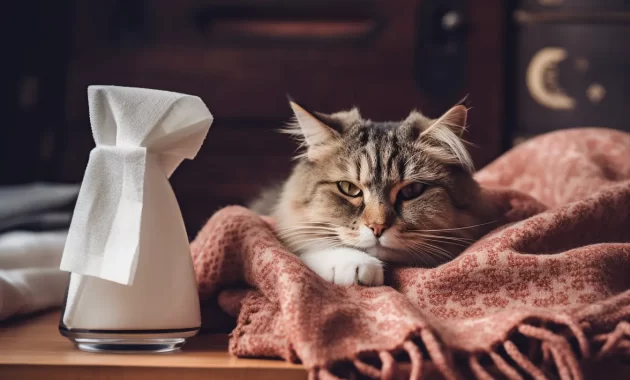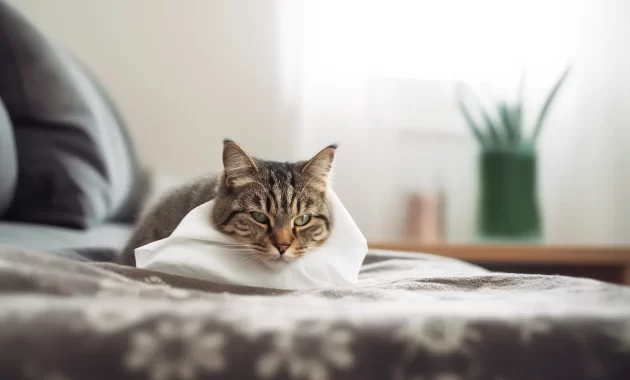
If you’re a cat owner, you’ve likely heard of kennel cough – a respiratory disease commonly affecting dogs.
But have you ever wondered if your feline friend can catch it too?
While kennel cough is primarily associated with dogs, cats are not entirely immune to this illness.
They can contract similar respiratory infections caused by the same bacteria and viruses.
Although it’s not as common as in dogs, cats can still develop symptoms of kennel cough.
As pet owners, we must understand the signs and take preventative measures to protect our furry companions from getting sick.
So let’s dive into what exactly kennel cough is for cats and how to keep them safe from this respiratory disease.
What Is Kennel Cough In Cats?

Kennel cough, also known as canine infectious tracheobronchitis, is a highly contagious respiratory disease that affects dogs.
But can cats get kennel cough? The answer is yes and no.
While it’s uncommon for cats to contract the same virus as dogs, they can still develop respiratory infections that mimic kennel cough symptoms.
Transmission methods for kennel cough in cats may differ from those in dogs.
Cats are less likely to catch it from other felines than dogs, who are more prone to getting it from direct contact with infected animals or contaminated surfaces.
However, if a cat is exposed to an infected dog, it can catch the virus.
Risk factors for kennel cough in cats include living in crowded conditions like shelters and catteries or being around other pets who have contracted the virus.
Additionally, kittens and senior cats with weakened immune systems are more susceptible to developing respiratory infections, similar to kennel cough.
Keeping your cat up-to-date on vaccinations and minimizing their exposure to potentially infected animals can significantly reduce its risk of contracting any respiratory infection.
SEE ALSO
Cats That Have A High Prey Drive
5 Common Eye Problems In Cats
Common Symptoms Of Kennel Cough In Cats

Now that we know what kennel cough is in cats, the question arises: can felines get it like their canine counterparts?
The answer is yes, but it’s not as expected.
Cats are less likely to contract kennel cough since they don’t usually spend time in places where the disease spreads rapidly, such as boarding facilities or dog parks.
However, if your cat has been exposed to other infected animals, it can develop kennel cough.
The symptoms may not be as severe as those seen in dogs, but they can still cause discomfort and anxiety for you and your furry friend.
It’s essential to look for any signs of respiratory distress and seek veterinary care immediately.
Remember that natural therapies should never replace proper medical care if you’re looking for home remedies to treat your cat’s kennel cough symptoms.
However, you can provide some relief by offering a humidifier or steam treatment to help soothe their airways.
Additionally, make sure your cat stays hydrated and gets plenty of rest.
Regarding prevention, vaccination options are available for cats at risk of contracting kennel cough.
Be sure to talk to your veterinarian about which vaccines are recommended for your pet.
Causes Of Kennel Cough In Cats

As cat lovers, we always want our feline friends to be healthy and happy.
However, cats are not immune to respiratory infections like any other animal. In particular, cat respiratory infections can be caused by various factors – from bacterial and fungal infections to environmental irritants.
One common cause of cat respiratory infections is feline viral infections.
These viruses can cause symptoms such as sneezing, coughing, and runny nose in cats. Some of the most common feline viral infections include feline herpesvirus and calicivirus.
While kennel cough is a term typically used for dogs, it’s important to note that cats can also develop similar symptoms due to viral or bacterial infections.
However, cats are more likely to get respiratory infections at home or in shelters, unlike dogs, who usually contract kennel cough in crowded environments such as boarding facilities or dog shows.
This is why keeping your cat’s living space clean and free of irritants that could trigger respiratory issues is crucial.
Prevention And Treatment Of Kennel Cough In Cats
Now that we know the causes of kennel cough in cats, we must discuss prevention and treatment options.
While cats are less likely to contract kennel cough than dogs, it is still possible for them to become infected.
Prevention measures include keeping your cat away from other animals that may be infected, ensuring proper ventilation in their living space, and practising good hygiene by washing your hands after handling different animals.
If your cat contracts kennel cough, several treatment options are available.
Your veterinarian may prescribe antibiotics or cough suppressants to help alleviate symptoms.
Home remedies such as humidifiers or steam therapy can relieve your cat’s respiratory system.
It’s important to note that while these remedies can be helpful, they should not replace proper medical treatment.
Vaccination is one of the most effective ways to prevent kennel cough in cats.
While no vaccine is available specifically for feline kennel cough, some vaccines protect against viruses and bacteria associated with the disease.
Talk to your veterinarian about vaccine options and which may be appropriate for your cat based on their lifestyle and risk factors.
With proper preventive measures and timely treatment, you can help keep your furry friend healthy and happy!
When To Consult A Vet
Knowing the signs and symptoms is essential if you suspect your cat may have kennel cough.
Common signs include a dry cough, lethargy, and a loss of appetite.
If you notice any of these symptoms in your cat, it’s best to consult a veterinarian immediately.
While there is no specific cure for kennel cough in cats, several treatment options are available.
Your vet may prescribe antibiotics or other medications to help ease your cat’s symptoms and speed up healing.
Additionally, they may recommend rest and plenty of fluids to keep your cat hydrated.
It’s always better to be safe than sorry about your pet’s health.
If you’re unsure whether your cat has kennel cough, don’t hesitate to contact your veterinarian for advice.
With proper care and attention, most cats with kennel cough can fully recover in just a few days.
Frequently Asked Questions
What Are The Chances Of A Cat Getting Kennel Cough If It Has Been Vaccinated?
You may wonder how your cat will get kennel cough even after vaccination.
Well, the effectiveness of the vaccination depends on a variety of factors, such as the type of vaccine used and how closely it matches the strain of circulating kennel cough.
Also, dogs typically contract kennel cough in boarding facilities or dog parks.
However, cats can still be exposed to the disease through direct contact with an infected animal or by sharing food and water bowls.
Ultimately, staying vigilant and protecting your furry friend from potential transmission routes is essential.
Can Indoor Cats Get Kennel Cough?
Indoor cats can still get kennel cough, despite not being exposed to outdoor environments.
Symptoms of kennel cough in cats include sneezing, coughing, and runny noses.
To prevent transmission, keeping your cat away from other animals that may have been exposed to the bacteria that cause kennel cough is essential.
If your cat does develop symptoms, treatment options may include antibiotics or supportive care until the infection clears up.
As always, it is essential to consult with your veterinarian for proper diagnosis and treatment.
Is Kennel Cough Contagious To Humans?
If you’re worried about catching kennel cough from your furry friend, don’t be.
While the illness is highly contagious among dogs and cats, it is not transmittable to humans.
However, if your pet contracts kennel cough, you’ll want to watch for symptoms such as a persistent cough, sneezing, and runny nose.
Treatment options can vary depending on the severity of the illness and may include antibiotics, cough suppressants, and rest.
Remember to always consult with your veterinarian for proper diagnosis and treatment.
How Long Does It Take For A Cat To Recover From Kennel Cough?
If your cat suffers from kennel cough, you may wonder how long it will take them to recover.
While the answer varies depending on the severity of the infection, it typically takes about 1-3 weeks for a cat to recover from this respiratory illness fully.
There are some home remedies you can try to help ease their symptoms, such as humidifying the air and providing plenty of fluids.
However, if your cat’s condition worsens or they are not improving after a few days, it is essential to seek veterinary care.
Remember that early intervention is critical when treating kennel cough in cats.
Can Kennel Cough Lead To More Serious Health Issues In Cats?
Kennel cough, also known as canine infectious respiratory disease, is a highly contagious illness that can affect cats just like it does dogs.
While it’s less common in felines, they can still contract the disease through exposure to infected animals.
If left untreated, kennel cough can lead to more severe health issues like pneumonia and bronchitis.
Risk factors for cats include living in crowded or stressful environments where they may come into contact with other infected animals.
Treatment options for kennel cough in cats typically involve supportive care measures such as rest, hydration, and antibiotics to combat bacterial infections.
It’s essential to seek veterinary care promptly if you suspect your cat may have kennel cough, as early treatment can help prevent complications and ensure a speedy recovery.
Conclusion
In conclusion, while cats can get a respiratory infection similar to kennel cough, it is not the same as the one that affects dogs.
However, cats can still contract various infections and illnesses affecting their respiratory system.
Even if a cat has been vaccinated against kennel cough, there is still a chance for them to get other respiratory infections.
While indoor cats are less likely to contract kennel cough or other infections due to limited exposure to other animals, it is still possible.
Cat owners need to keep up with their pet’s vaccinations and monitor any symptoms of illness.
If you suspect your cat has kennel cough or any respiratory infection, consult with your veterinarian immediately, as prompt treatment can prevent more severe health issues from developing.




